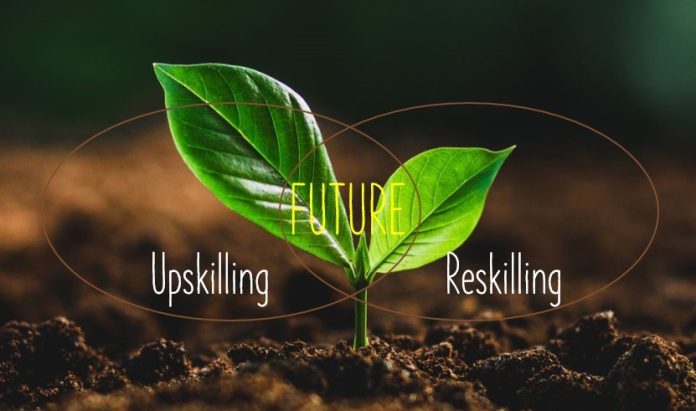The UK Government’s commitment to achieving net-zero emissions by 2050 will lead to a major shift in the labour market. It’s anticipated that we will see the creation of new job opportunities in green technology and renewable energy. This will be combined with a potential reduction in the number of jobs in high-carbon industries.
With around 80% of the current UK workforce still expected to be active in 2030, companies and individuals must adapt through reskilling and upskilling to ensure there’s the required knowledge and skills available to transition towards a more sustainable and environmentally friendly economy. And the transition has already begun. Job postings requiring green skills have grown around 8% worldwide in the past eight years, while the share of green talent has also grown by around 6% each year.
We recently spoke to Ford Garrard, CEO of Visuna, to discuss the importance of reskilling in helping to facilitate the adoption of sustainable practices. In this interview, Ford shares his unique insights into the changes he’s seen within the green energy sector, why reskilling is important and what trends he expects to emerge within the next five years.
How has the green energy sector evolved over the past five years?
“The energy sector has been, and still is, undergoing huge changes. In order to meet carbon-cutting goals, the appetite to include more green sources in the energy mix is growing. Still, there’s a delicate balancing act between sustainability, reliability and affordability. This energy trilemma has called for innovation and technological advances in the sector that we’ve not seen before. There’s been a call for cleaner, more intelligent and optimised solutions to future-proof the sector, and the general public is more environmentally aware than ever.”
“There’s a delicate balancing act between sustainability, reliability and affordability. This energy trilemma has called for innovation and technological advances in the sector that we’ve not seen before.”
What are the challenges facing businesses recruiting in the green energy sector?
“With the green energy sector innovating and changing so quickly, businesses are finding it challenging to source candidates with the relevant experience and skills for what can be very specialist, niche roles. Rapid developments in the renewable energy industry mean job roles are appearing that didn’t exist a few years ago. Employers need to be open-minded and support the transition of workers’ skills and expertise from other industries, with the mindset that they can learn and develop.”
“Employers need to be open-minded and support the transition of skills and expertise of workers from other industries.”
What are the most in-demand green energy jobs?
“The huge growth in offshore wind in recent years has led to a huge demand for wind turbine technicians. As more countries around the world realise the potential of wind energy, the need for specialists to ensure the smooth running of these operations will increase.”
Why is reskilling important for developing a thriving green energy sector?
“The oil and gas industry has supported hundreds of thousands of jobs worldwide for decades, both directly and indirectly, through the supply chain. As we move towards alternative energy sources, jobs in the high-carbon sector will decline over time. This means that it’s essential for governments, education providers and industry to collaborate and identify the skills and training required to support workers in the transition from traditional to green energy sectors.”
“It’s essential for governments, education providers and industry to collaborate and identify the skills and training required.”
What would be your top piece of advice for HR professionals looking to build a green energy workforce?
“It’s important to remember how transferrable many of the skills in oil and gas jobs are to the green energy sector. For example, engineers in refineries will be able to apply their experience of raw materials to the production of clean fuels, and workers involved in the transport of gas can apply their knowledge to the movement of hydrogen supplies. This means the green energy industry can benefit from the experience of thousands of skilled workers in high-carbon sectors.”
What trends do you see coming to fruition over the next five years?
“The diverse range of career paths available in the green energy industry will continue to develop, and we’ll see many skilled professionals moving from traditional energy sectors to greener areas. Plus, the importance of technology in the energy transition will continue to grow. As more renewables come online, the demand for storage increases, so testing new technologies and improving existing solutions to expand capacity and lower costs is essential. Smart grids capable of shifting demand are an example of untapped technology potential likely to be developed. These initiatives will all create a variety of new career opportunities for the future workforce.”
Conclusion
Reskilling the UK workforce is essential to achieving the country’s net-zero carbon emissions target, and creating a more sustainable economy and a greener future for everyone. Companies and their workforces play a key role in this crucial transition and can take the first step by investing in training and upskilling to ensure they are best prepared for the rewarding yet challenging times ahead.


































